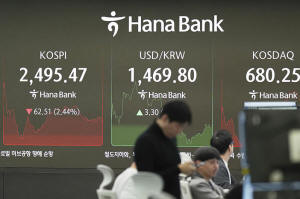Asian shares are sharply lower, Tokyo and Taiwan tumble 4%, after Wall
Street retreat
[March 31, 2025] By
JUNZHE JIANG
HONG KONG (AP) — Asian shares tumbled Monday, with benchmarks in Tokyo
and Taiwan falling more than 4%, while the price of gold hit a record
high at nearly $3,150 an ounce.
Investors have pulled back and sought traditional safe havens like gold
as worries build over a potentially toxic mix of worsening inflation and
a U.S. economy slowing because households are afraid to spend due to the
deepening trade war that has escalated under U.S. President Donald
Trump.
U.S. futures and oil prices were lower.
Thailand’s SET lost 1.5% after a powerful earthquake centered in Myanmar
rattled the region, causing widespread destruction in the country, also
known as Burma, and less damage in places like Bangkok.
Shares in Italian Thai Development, developer of a partially built
30-story high-rise office building under construction that collapsed,
tumbled 27%. Bangkok's governor said authorities would investigate the
cause of the disaster, which left dozens of construction workers
missing.
Globally, the trade war is the abiding focus. Many of the countries that
run trade surpluses with the U.S. and depend heavily on export
manufacturing are in Asia, Stephen Innes of SPI Asset Management said in
a commentary.
“Asia is ground zero. Of the 21 countries under USTR (U.S. Trade
Representative) scrutiny, nine are in Asia,” he noted.
Tokyo’s benchmark fell 4.1% to 35,617.56, while the Hang Seng in Hong
Kong lost 1.2% to 23,135.01.

The Shanghai Composite index declined 0.5% to 3,335.67.
In South Korea, the Kospi fell 3% to 2,481.12, while Australia's S&P/ASX
200 sank 1.7%, closing at 7,843.40.
Taiwan’s Taiex lost 4.2%.
On Friday, the S&P 500 dropped 2% to 5,580.94, for one of its worst days
in the last two years. It was its fifth losing week in the last six.
The Dow Jones Industrial Average sank 715 points, or 1.7%, to 41,583.90,
and the Nasdaq composite fell 2.7% to 17,322.99.
Lululemon Athletica led the market lower with a drop of 14.2%, even
though the seller of athletic apparel reported a stronger profit for the
latest quarter than analysts expected.
Oxford Industries, the company behind the Tommy Bahama and Lilly
Pulitzer brands, likewise reported stronger results for the latest
quarter than expected but still saw its stock fall 5.7%
[to top of second column] |

The screens showing the Korea Composite Stock Price Index (KOSPI),
left, the foreign exchange rate between U.S. dollar and South Korean
won and the Korean Securities Dealers Automated Quotations (KOSDAQ)
are seen at a foreign exchange dealing room in Seoul, South Korea,
Monday, March 31, 2025. (AP Photo/Lee Jin-man)
 One of the main worries hitting Wall
Street is that President Donald Trump’s escalating tariffs may cause
U.S. households and businesses to freeze their spending. Even if the
tariffs end up being less painful than feared, all the uncertainty
may filter into changed behaviors that hurt the economy.
A report on Friday showed all types of U.S. consumers are getting
more pessimistic about their future finances. Two out of three
expect unemployment to worsen in the year ahead, according to a
survey by the University of Michigan. That’s the highest reading
since 2009, and it raises worries about a job market that’s been a
linchpin keeping the U.S. economy solid.
A separate report also raised concerns after it showed a widely
followed, underlying measure of inflation was a touch worse last
month than economists expected.
The Fed could return to cutting interest rates, like it was doing
late last year, in order to give the economy and financial markets a
boost. But such cuts would also push upward on inflation, which has
been sticking above the Fed’s 2% target.
The economy and job market have been holding up so far, but if they
were to weaken while inflation stays high, it would produce a
worst-case scenario called “stagflation.” Policy makers in
Washington have few good tools to fix it.
Stock markets worldwide appear shaky as a Wednesday deadline
approaches for more tariffs. Trump has dubbed it “Liberation Day,”
when he will roll out tariffs tailored to each of the United States’
trading partners.
In other dealings early Monday, U.S. benchmark crude oil lost 4
cents to $69.32 per barrel. Brent crude oil fell 2 cents to $72.74
per barrel.
The U.S. dollar fell to 149.02 Japanese yen from 149.84 yen. The
euro rose to $1.0839 from $1.0803.
All contents © copyright 2025 Associated Press. All rights reserved |